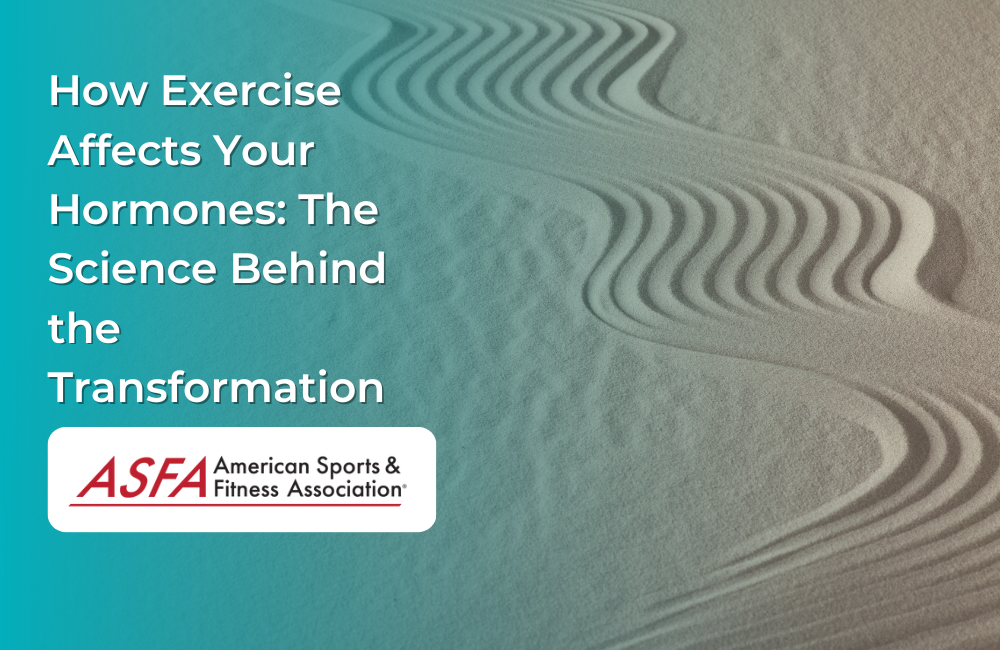
How Exercise Affects Your Hormones
Exercise is a powerful tool that not only shapes your body but also has a profound impact on your hormonal balance. It triggers a cascade of hormone-related responses in your body, leading to various physical and mental benefits. In this article, we'll explore how exercise affects your hormones and why these changes are crucial for your overall health and well-being.
The Hormones at Play:
To understand how exercise affects your hormones, let's take a closer look at some key hormones involved in the process:
- Endorphins: Often referred to as "feel-good" hormones, endorphins are neurotransmitters that reduce pain perception and promote a sense of well-being.
- Adrenaline: Also known as epinephrine, adrenaline is the "fight or flight" hormone produced by the adrenal glands. It increases heart rate, blood flow to muscles, and energy levels during exercise.
- Cortisol: Produced by the adrenal glands, cortisol is a stress hormone. While it can have negative effects when chronically elevated, during exercise, it helps regulate energy production and manage stress.
- Insulin: Insulin is involved in regulating blood sugar levels. Exercise enhances insulin sensitivity, making it easier for cells to take up glucose from the bloodstream.
- Growth Hormone (GH): GH is essential for growth, repair, and maintenance of tissues. It's released in response to exercise, particularly during strength training and high-intensity workouts.
- Testosterone: Testosterone is a hormone associated with muscle growth, strength, and overall fitness. Exercise, especially resistance training, can lead to increased testosterone production.
The Exercise-Hormone Connection:
Endorphins:
- Effect: Exercise, especially aerobic activities like running, cycling, or dancing, stimulates the release of endorphins, leading to an improved mood and reduced perception of pain.
Adrenaline:
- Effect: Short bursts of high-intensity exercise trigger the release of adrenaline, providing a quick energy boost and heightened alertness. This hormone helps prepare your body for physical challenges.
Cortisol:
- Effect: Moderate exercise can temporarily raise cortisol levels, but regular physical activity helps regulate cortisol production, reducing stress and anxiety over time.
Insulin:
- Effect: Exercise enhances insulin sensitivity, allowing cells to absorb glucose more efficiently. This helps stabilize blood sugar levels and reduces the risk of insulin resistance and type 2 diabetes.
Growth Hormone (GH):
- Effect: High-intensity workouts, especially resistance training and interval training, stimulate the release of GH. This hormone supports muscle growth, tissue repair, and fat metabolism.
Testosterone:
- Effect: Strength training and resistance exercises can lead to increased testosterone levels, contributing to muscle development, improved bone density, and overall fitness.
The Long-Term Benefits:
Regular exercise has a profound impact on your hormonal balance, leading to several long-term benefits:
- Improved Mood: The release of endorphins during exercise helps reduce symptoms of depression and anxiety, promoting a positive mood.
- Stress Reduction: Exercise helps regulate cortisol levels, reducing chronic stress and its associated health risks.
- Enhanced Metabolism: Improved insulin sensitivity and hormonal balance aid in weight management and reduce the risk of metabolic disorders.
- Muscle Growth: The release of growth hormone and increased testosterone levels during strength training promote muscle development and strength.
- Bone Health: Exercise, especially weight-bearing activities, enhances bone density and reduces the risk of osteoporosis.
- Heart Health: Regular aerobic exercise improves cardiovascular health by lowering blood pressure and reducing the risk of heart disease.
The Importance of Balance:
While exercise offers numerous hormonal benefits, it's essential to strike a balance. Overtraining or excessive exercise can lead to hormone imbalances, such as elevated cortisol levels and decreased immunity. Listening to your body, allowing for adequate rest, and incorporating a variety of exercise types into your routine can help maintain hormonal equilibrium.
In conclusion, exercise is not only about physical fitness but also about creating a harmonious hormonal environment in your body. Regular physical activity positively influences hormone production, leading to better mood, reduced stress, improved metabolism, and enhanced overall health. Incorporating exercise into your daily life can be one of the most effective ways to optimize your hormonal balance and achieve both physical and mental well-being.




